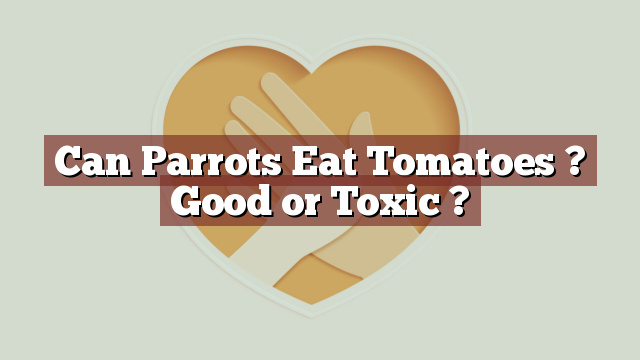Can Parrots Eat Tomatoes? Good or Toxic?
It is important for parrot owners to be aware of what foods are safe for their feathered friends. A balanced and nutritious diet is crucial for the overall health and well-being of parrots. One common question that arises is whether parrots can safely consume tomatoes. In this article, we will explore the nutritional value of tomatoes for parrots, discuss their safety, potential risks and benefits, and provide guidance on what to do if your parrot consumes tomatoes.
Nutritional Value of Tomatoes for Parrots
Tomatoes are a popular fruit that is widely used in cooking due to its rich flavor and versatility. They are packed with essential vitamins and minerals that can contribute to a well-rounded diet for parrots. Tomatoes are an excellent source of vitamin C, which helps boost the immune system and promote overall health. They also contain vitamin A, which is important for maintaining healthy eyesight and skin.
In addition to vitamins, tomatoes are rich in antioxidants such as lycopene, which has been linked to various health benefits in humans. While there is limited research on the effects of lycopene in parrots specifically, it is possible that these antioxidants can provide similar benefits for these birds.
Are Tomatoes Safe or Toxic for Parrots?
Yes, parrots can safely eat tomatoes. In fact, tomatoes are considered safe for most parrot species. However, it is important to note that some parrots may have individual sensitivities or allergies to certain foods, including tomatoes. Therefore, it is always recommended to introduce new foods gradually and monitor your parrot’s reaction.
Potential Risks and Benefits of Feeding Tomatoes to Parrots
While tomatoes are generally safe for parrots, there are a few potential risks to be aware of. Tomatoes belong to the nightshade family, which includes other plants such as potatoes and peppers. These plants contain a compound called solanine, which can be toxic in large quantities.
The good news is that the solanine levels in ripe tomatoes are generally low and unlikely to cause harm to parrots when consumed in moderation. However, it is important to avoid feeding your parrot any green, unripe tomatoes or tomato plants, as these can contain higher levels of solanine.
On the other hand, the nutritional benefits of feeding tomatoes to parrots in moderation outweigh the potential risks. The vitamins and antioxidants found in tomatoes can contribute to a healthy immune system and overall well-being for your feathered friend.
What to Do if Your Parrot Eats Tomatoes
If your parrot accidentally consumes tomatoes or you notice any adverse reactions, it is important to take appropriate action. The first step is to remove any remaining tomatoes from your parrot’s access. Watch for any signs of digestive discomfort such as vomiting or diarrhea. If you notice any concerning symptoms or if your parrot’s condition worsens, it is crucial to seek immediate veterinary assistance.
Conclusion: Feeding Tomatoes to Parrots in Moderation
In conclusion, parrots can safely enjoy the nutritional benefits of tomatoes as part of a balanced diet. The vitamins, minerals, and antioxidants found in tomatoes can contribute to their overall health and well-being. However, it is important to feed tomatoes to parrots in moderation and avoid any unripe or green tomatoes. As always, if you have any concerns or questions about your parrot’s diet, consult with a qualified avian veterinarian for personalized advice.
Thank you for investing your time in exploring [page_title] on Can-Eat.org. Our goal is to provide readers like you with thorough and reliable information about various dietary topics. Each article, including [page_title], stems from diligent research and a passion for understanding the nuances of our food choices. We believe that knowledge is a vital step towards making informed and healthy decisions. However, while "[page_title]" sheds light on its specific topic, it's crucial to remember that everyone's body reacts differently to foods and dietary changes. What might be beneficial for one person could have different effects on another. Before you consider integrating suggestions or insights from "[page_title]" into your diet, it's always wise to consult with a nutritionist or healthcare professional. Their specialized knowledge ensures that you're making choices best suited to your individual health needs. As you navigate [page_title], be mindful of potential allergies, intolerances, or unique dietary requirements you may have. No singular article can capture the vast diversity of human health, and individualized guidance is invaluable. The content provided in [page_title] serves as a general guide. It is not, by any means, a substitute for personalized medical or nutritional advice. Your health should always be the top priority, and professional guidance is the best path forward. In your journey towards a balanced and nutritious lifestyle, we hope that [page_title] serves as a helpful stepping stone. Remember, informed decisions lead to healthier outcomes. Thank you for trusting Can-Eat.org. Continue exploring, learning, and prioritizing your health. Cheers to a well-informed and healthier future!

